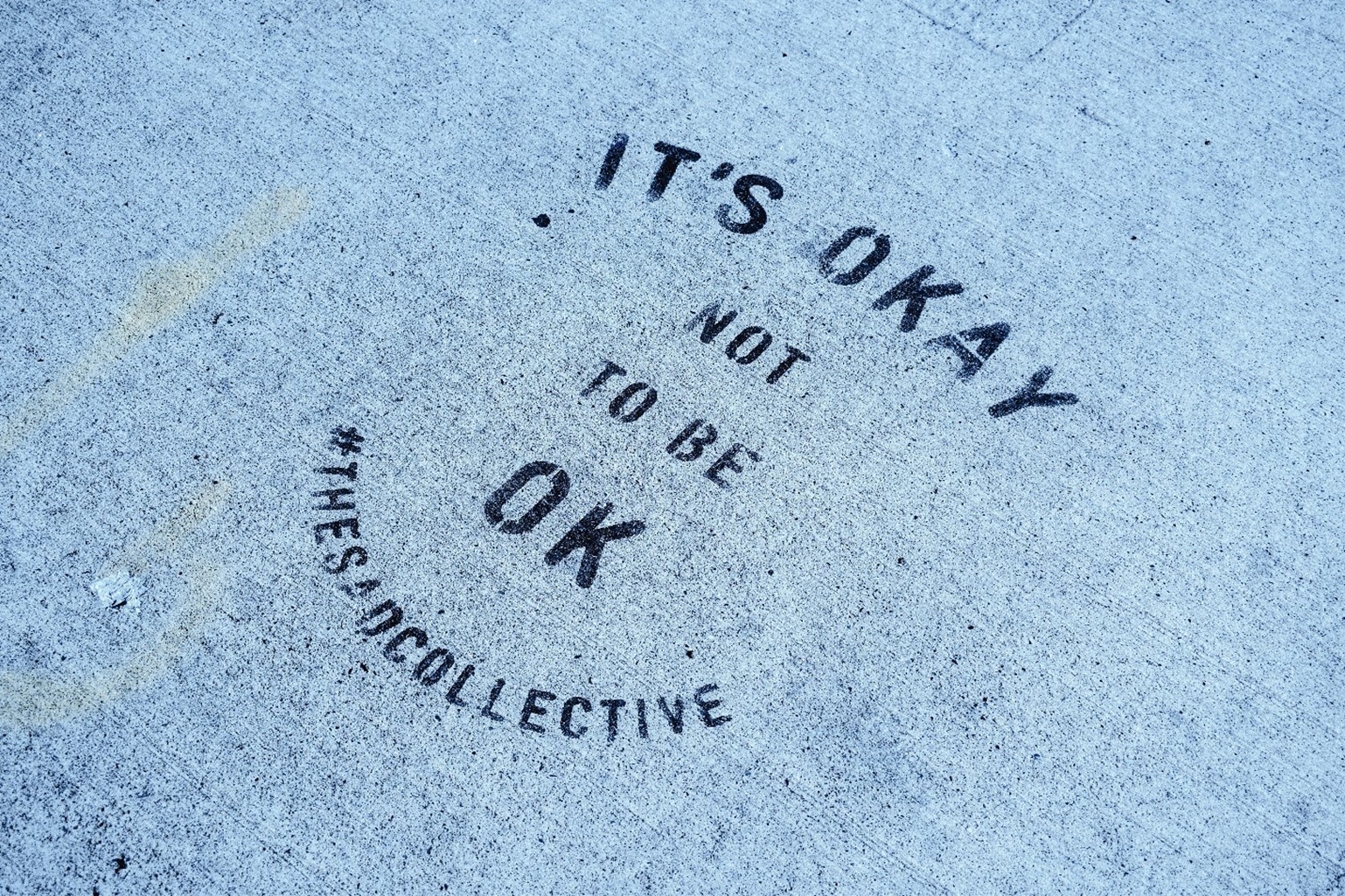It has been two years since my article, 10 Ways to Stay Mentally Strong During a Pandemic was published In ways it seems like yesterday, but also a lifetime ago. If the ups and downs of the global pandemic and variants over the last 24 months weren’t enough, there were a myriad of simultaneous socio-political events that prevailed over this time period. Stressors such as civil unrest, political dissension, domestic terrorism, natural disasters, global warming, inflation, and impending wars are unsettling for most people. Then just think of what happened in your personal life: births, deaths, financial issues, health problems, marriage, divorces, etc. It is no wonder that many are feeling stressed, anxious, worried, and overwhelmed. It is not just the events but the duration of time that is causing people, even the mentally resilient, not to feel “ok” at times. Both the collective and the interpersonal “traumas” over time can be a lot to bear.
It’s OKAY Not to Feel Ok.
This includes mentally strong individuals who possess inherent traits and techniques to remain resilient. Mentally resilient people, those who bounce back from setbacks and end up growing from the challenges in life generally have personality traits that are adaptive, and flexible, and they demonstrate emotional maturity. They also tend to utilize effective emotion regulation skills to reduce the likelihood of emotional vulnerability by inherently using skills during difficult times.
In the field of counseling, we rely on theories such as Dialectical Behavior Therapy (DBT; Linehan, 1993) to teach individuals these various emotion regulation techniques that can assist in coping with adverse events effectively. Knowing these skills and using them may help you regulate your emotions during these unsettling times. Using the techniques outlined in this article including DBT may help you reduce emotional vulnerability, thus increasing positive states of mind and decreasing negative states.
Dialectical Behavior Therapy
Dialectical Behavior Therapy is an integrative approach created to treat patients with borderline personality disorder and is the most used and extensively studied approach for this clinical population (Stoffers et al., 2012). For example, a meta-analysis of 5 randomized controlled trials demonstrated the efficacy of DBT therapy in stabilizing and controlling self-destructive behavior (suicidal and parasuicidal behavior) (Panos et al., 2014). DBT has also demonstrated treatment efficacy with other psychiatric disorders beyond personality disorders, such as post-traumatic stress disorder ((Harned et al., 2014), depression (Lynch et al., 2007), anxiety, and hopelessness (Lothes, 2014). The hallmark of DBT theory is that emotion regulation and distress tolerance skills can be taught to reduce suffering and decrease mental health symptoms.
4 Techniques to Reduce Emotional Vulnerability
Drawing on the theoretical tenets from both DBT and CBT may help you manage stressful times by helping to “check” your emotional mind.
1. Realize you can feel “bad” but be “doing well.”
How you feel is different than how you are doing. One of the most common misconceptions I see in my clients is the belief that it’s not “normal” to have good days and bad days. I’ve heard things like, “I woke up this morning in a funk, I don’t understand why—what’s wrong with me?” or “I’ve had a bad few days, and I don’t know why!” It’s unrealistic to expect that you will be happy and content most or all of the time—especially after the last two years. It’s important to realize that one may be feeling sad, anxious, or overwhelmed, but still, be “doing well” overall. What does this mean? From a clinical mental health perspective, having problems in one’s life that are unmanageable often leads to what we call impairments in social and occupational functioning. In contrast, it’s normal to feel poorly but still be able to manage life reasonably well. When someone is feeling irritable, sad, anxious, or “off,” questions to ask themselves include: “Did I go to work today?” “Did I feed my kids?” “Did I do my homework? How am I doing in school?” “Am I meeting the expectations of my work, my family, and my social circle?” If the answer is yes to most or all of these questions, that likely means that someone may be feeling poorly but still doing “well.” If the feelings continue over a duration of time or have impacts on these areas, then it may be that seeking mental health care is appropriate.
2. Limit news and social media exposure.
Chronic news exposure may worsen distress. For example, researchers found people that who were exposed to the media daily during an ebola outbreak in 2014 demonstrated poorer functioning and increased distress, compared to those who limited their media intake. Similar studies after the 9/11 attacks found that watching distressing media led to impairments in mental health. Therefore, choosing to limit one’s exposure to distressing images and consuming media in manageable doses is vital.
3. Implement PLEASE skills.
Linehan (2015) used the acronym PLEASE to highlight those factors that may increase your emotional vulnerability on a daily basis. Taking stock of these factors each day can help protect your emotional mind from taking over.
- PL: Are you attending to your physical health? Are you taking prescribed medications if you have medical problems?
- E: Balanced eating. Are you eating regularly? Eating healthy nutritional foods is key.
- A: Avoiding mood-altering substances. Research suggests that both alcohol and drugs can damage the brain and increase negative mood states.
- S: Balanced sleep. Adequate amounts of REM sleep restore both the mind and body, especially over time.
- E: Exercise. Exercise leads to healthier brain states (Amen, 2018), and both outdoor activity and exposure to the sun (vitamin D) have other health benefits. Some research suggests it may have even offered some protection against the omicron variant.
4. Implement radical acceptance.
Linehan also coined a useful technique, known as radical acceptance, that entails accepting reality for what it is, even when we don’t want to. Radical means all the way and completely. Acceptance means that you stop fighting reality because you don’t want to deal with it. Rejecting reality does not change it and turns temporary pain into ongoing suffering. Therefore, radically accepting those things you cannot change—such as war, civil unrest, or the death of a loved one—may help ease your suffering. After radically accepting, perhaps you can think of positive actions that are within your control—like making a donation to a worthy cause or engaging in advocacy work. Radical acceptance can help you come to terms with the fact that life is full of both beauty and pain—and that no one moves through life without either. Accepting that life is well worth living and experiencing, even though there are painful experiences, is key. You may even grow wiser and stronger along the way. Knowing that life is full of both painful and beautiful events, and no human moves through life without either.. could be a key to your future happiness! Life is worth living and experiencing because you can choose to grow wiser and stronger because of your painful events.
Please read more in Psychology Today...
Copyright 2022: Tracy Hutchinson, Ph.D.
References
Holman, E. A., Garfin, D. R., Lubens, P., & Silver, R. C. (2020). Media Exposure to Collective Trauma, Mental Health, and Functioning: Does It Matter What You See? Clinical Psychological Science, 8(1), 111-124.
Linehan, M. M. (1993a). Cognitive behavioral therapy of borderline personality disorder. New York, NY: Guilford Press.
Lothes, J. & Mochrie, K. (2014). The Effects of a DBT Informed Partial Hospital Program on: Depression,Anxiety, Hopelessness, and Degree of Suffering. Journal of Psychology and Psychotherapy. DOI:10.4172/2161-0487.1000144
Panos, P., Jackson, J., Hasan, O., & Panos, A. (2014), Meta-Analysis and Systematic Review Assessing the Efficacy of Dialectical Behavior Therapy (DBT). Research on Social Work Practice 24(2), 213-223. DOI:10.1177/1049731513503047
Stoffers, J. M., Völlm, B. A., Rucker, G., Timmer, A., Huband, N., and Lieb, K. (2012). Psychological therapies for people with borderline personality disorder. Cochrane Database Syst. Rev. 8:CD005652. doi: 10.1002/14651858.CD005652.pub2
Thompson, R. R., Jones, N. M., Holman, E. A., & Silver, R. C. (2019). Media exposure to mass violence events can fuel a cycle of distress. Science Advances, 5(4), eaav3502. https://doi.org/10.1126/sciadv.aav3502




